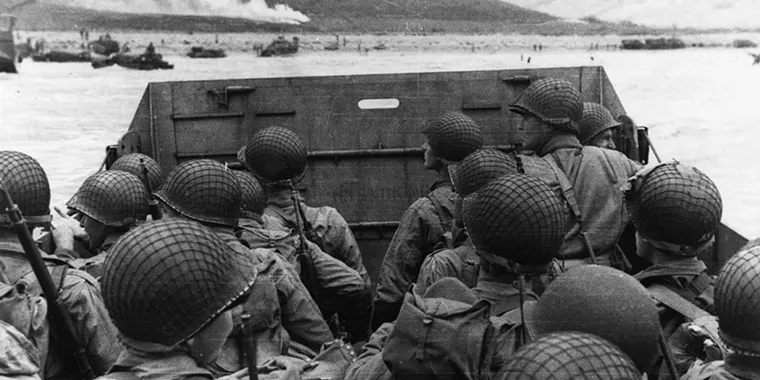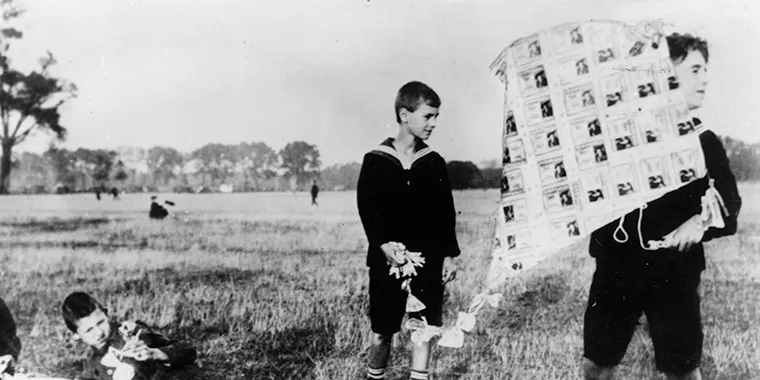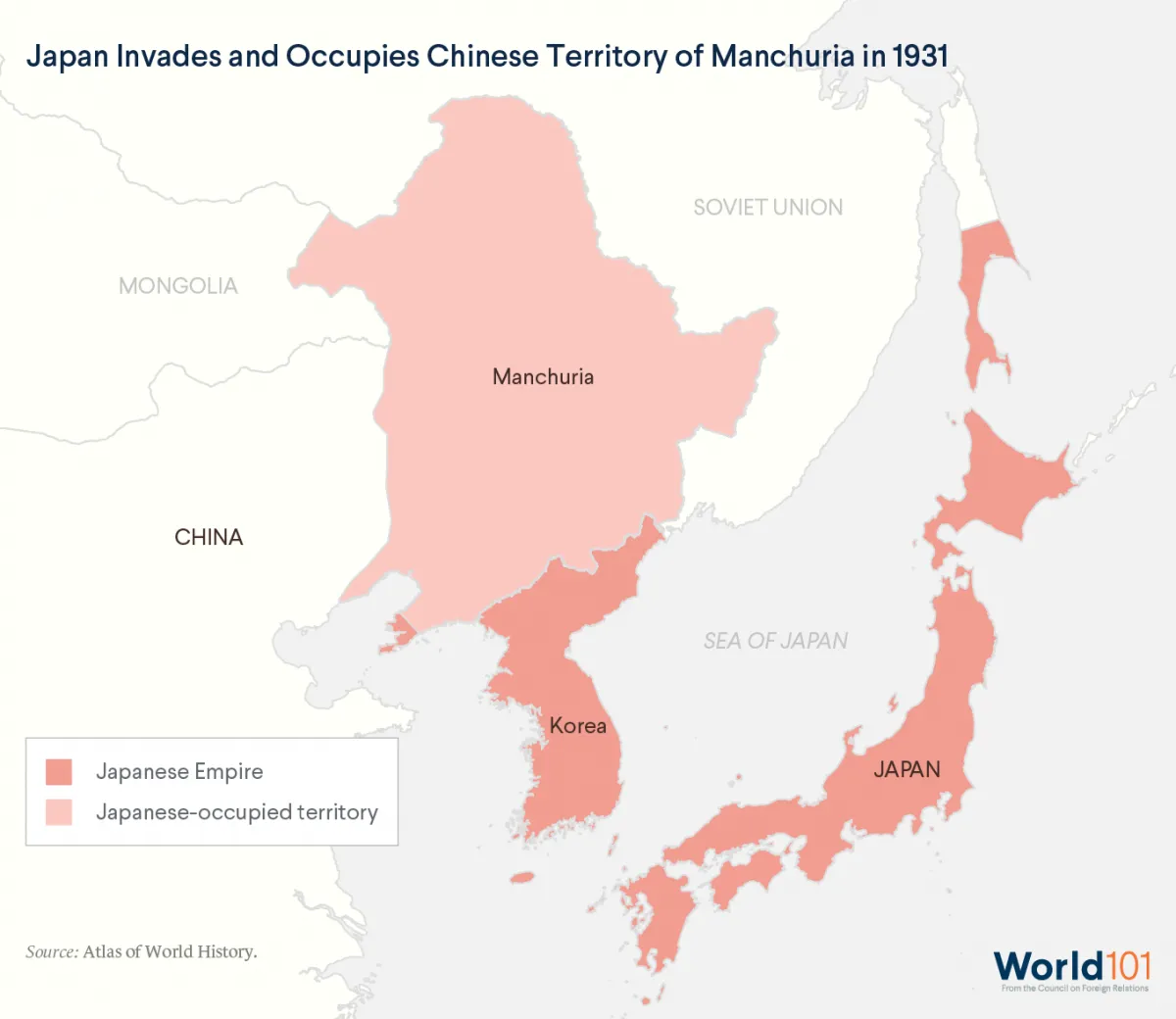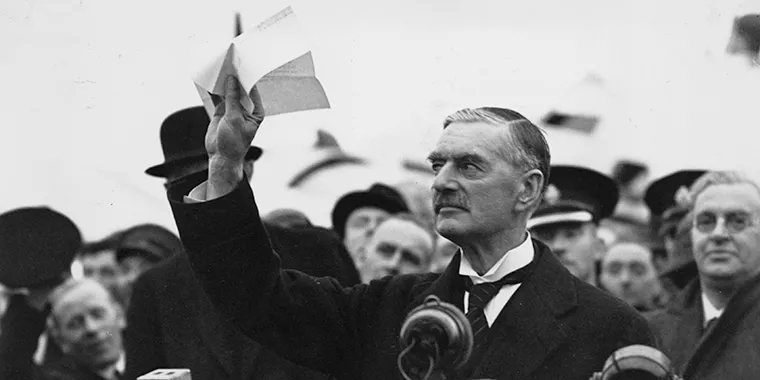Organization That Was Formed to Ensure That Full Scale World War Did Not Occur Again Is Known as

When Globe War I ended in 1918, the last affair people wanted was an even greater disharmonize. And then why did the world render to gainsay but two decades afterward to fight World War Two?
Granted, Germany'southward invasion of Poland in 1939 triggered declarations of war from French republic and the Britain, formally starting Globe War II. Simply that event was only the final harbinger in a series of events. Various other economic and political challenges had been building up tension for years.
This lesson examines the era between World Wars I and Ii—also known as the interwar period—breaking down those issues that fix the stage for the globe'southward 2d and far deadlier global conflict.
The Treaty of Versailles
In 1919, representatives from more than 2 dozen countries gathered in France to draft peace treaties that would set the terms for the end of World War I. Nonetheless, in a interruption with tradition, those on the losing end of the conflict were excluded from the conference. This particularly stirred resentment in Germany, the largest and most powerful defeated country.
Without German input, the victors—led by the U.s., France, and the United Kingdom—decided what peace would look like after the conflict.
U.South. President Woodrow Wilson wanted to structure peace co-ordinate to his framework for preventing time to come global conflicts. This framework, known every bit the Fourteen Points, advocated for the establishment of an international system chosen the League of Nations, which would be staked on the idea of collective security, meaning the invasion of one land would be treated like a threat to the entire group. Wilson'southward 14 Points too called for arms reductions and gratis merchandise and helped lay the groundwork for the principle of self-determination—the concept that groups of people united by common characteristics should be able to decide their political future.
Meanwhile, French Prime Minister Georges Clemenceau, fearing a resurgent Germany on French republic's border, pushed for a bargain that seemed to some more punishment than peace.
Negotiations dragged on for months, simply in the end, the Treaty of Versailles forced Germany to accept arraign for the disharmonize, give up its overseas colonies and 13 percent of its European territory, limit the size of its ground forces and navy, and pay reparations (financial amercement) to the war'south winners.
Back dwelling, Germans were incensed and staged protests over what they saw equally harsh and humiliating terms. In 1923, Nazi leader Adolf Hitler said the treaty was designed "to bring twenty million Germans to their deaths and to ruin the German language nation." One of the central tenets of the Nazi political party was to disengage the deal, and entrada promises like those helped the group proceeds followers.
![]()
The exact role of the peace agreement in dooming the world to another war is all the same hotly contested. But some observers at the time had doubts it would ensure an end to hostilities. Economist John Maynard Keynes quit his mail service with the British delegation to Versailles over the treaty, which he argued was too punitive and would lead to catastrophe in Europe. One French military leader predicted with alarming accuracy that the treaty did not stand for peace only rather an "armistice for twenty years."
The aftermath of World War I revealed that the way leaders make peace can exist used as kindling for the future fires of war.
The League of Nations and Diplomatic Idealism
The League of Nations emerged from the Treaty of Versailles with thirty-two member countries, including well-nigh of the victors of World State of war I, and eventually expanded to include Germany and the other defeated nations. (Despite President Wilson's ardent campaigning, the U.S. Senate rejected membership.) Nether the arrangement's founding agreement, these countries promised not to resort to state of war once again.
The League was premised on the idea that security threats to one member demanded responses from all members. Just when it came time to answer to those threats, the organization largely failed.
The League'due south section for settling international disputes required unanimous agreement before taking action, which severely limited its ability to act. For instance, after Nihon invaded the Chinese region of Manchuria in 1931, the League was unable to compel Nippon to exit given the land's veto power.
In 1935, Italy invaded Abyssinia (now Federal democratic republic of ethiopia), and, one time once again, the League's response was minimal. In an urgent address to the system, Ethiopian Emperor Haile Selassie asked, "What accept become of the promises made to me?"
The unrealistic optimism that helped doom the League also plagued international relations more widely at the fourth dimension. For example, the 1928 Kellogg-Briand Pact obligated its signatories to resolve conflicts without resorting to violence. Still, the pact was effectively meaningless, every bit countries like Germany, Italian republic, and Japan blew through international agreements meant to prohibit aggression and expansionism and countries such every bit France and the United kingdom refused to act to preserve the residual of power.
Traumatized and weakened from the Beginning Globe War, the League's neat powers proved non only unable to reply to these security threats simply uninterested in addressing them. Every bit a result, the group's toothless response to breathy aggression only encouraged more than invasions.
By the onset of Globe State of war II, the League had been effectively sidelined from international politics. Many experts believe its lack of U.Due south. membership doomed the arrangement from the offset. Meanwhile, the withdrawal of other countries—Germany, Italy, and Japan had all left by 1937—besides undermined the grouping's brownie.
Though the League ultimately failed to prevent World War II, the organization made critical inroads on problems such as global wellness and arms control. Many of the group's agencies and ideals carried over to its successor organization, the United Nations. Just the challenges associated with commonage security remain. Even amid the COVID-19 pandemic, the United nations has struggled to take action due to disagreements among powerful member countries.
The Rise of Hitler
Germany's road to the 2nd World War began near the cease of the first, when it signed an armistice in Nov 1918. Although leaders on the frontlines saw the war was unwinnable, others refused to accept defeat.
A myth began to take hold that Deutschland could have won the war had it not been for unrest at habitation. This myth, promoted by conservatives and the military, falsely accused Jewish people and left-wing activists of stabbing the country's war effort in the back. Some called members of the Weimar Commonwealth—Germany'southward new, autonomous government—the "November criminals" and blamed them for Germany'due south loss in Globe War I.
Then, back-to-back crises hitting the German economy. In the early 1920s, the state experienced hyperinflation, a state of affairs in which prices skyrocketed so quickly that German currency lost much of its value. Savings were suddenly worthless, and by 1923, buying bread required a wheelbarrow for carrying bills.

After a period of economic recovery—and a moment in which information technology seemed democracy could take hold in Federal republic of germany—the Nifty Depression kicked off a new era of fiscal and political turmoil. Betwixt 1929 and 1932, German unemployment skyrocketed most fivefold, somewhen affecting a quarter of the labor forcefulness. Confronting this backdrop, pop support for the Nazi party surged. Between parliamentary elections in 1928 and 1933, the party went from winning three percentage of the vote to 44 per centum.
The Nazis promised to tear up the Treaty of Versailles, resurrect the economic system, and restore German honor. They also sought to create a much larger, racially pure Germany. Under Nazi ideology, Germans were racially superior and entitled to greater territory or lebensraum (living space) in the due east. When they ascended to power, the Nazis persecuted those they saw as junior, including Jewish, Slavic, Black, and Roma people.

In 1933, German President Paul von Hindenburg appointed Hitler chancellor of the authorities. Many of the political elite thought they could control him. Instead, Hitler quickly seized the reins of the state, centralizing power and suspending civil liberties. Germany's short-lived experiment with democracy had failed.
Equally Frg's accented ruler, or führer, Hitler reintroduced conscription, or mandatory war machine service; rebuilt the country'due south war machine; ordered the genocide of millions; and invaded countries beyond Europe. Three-quarters of a century later on his death, Hitler's rise to power and Germany'southward autumn from democracy into fascism serve as frightening reminders of the dangers of racism and extremism in politics.
Japanese Imperialism
Japan's 1941 aeriform bombardment of the Pearl Harbor naval base in Hawaii brought the Us back into another global disharmonize. Though U.S. President Franklin D. Roosevelt called the strike a surprise attack, it did not come out of nowhere; rather, it grew from Japan's ambitions for royal power.
Frustrations had been building for decades in Japan over the country'southward role in the world. In 1919, representatives from the country pushed for a statement affirming racial equality to be included in the Treaty of Versailles but were rejected. Discriminatory laws in several Western countries targeted Japanese clearing. And to many in Japan, the international arrangement that emerged after World War I seemed designed to privilege Westerners' access to wealth and resources.
Japan had long sought to accrue imperial power. Taiwan became Japan'southward kickoff colony in 1895, and more territory followed. In 1931, Japan invaded China'south Manchuria region, which provided a geographic buffer against Soviet communism also as abundant natural resource that the island nation desperately lacked. After provoking a state of war in 1937, the Japanese invaded huge parts of China to the due south of Manchuria.
The invasion of Manchuria arguably marks the starting time salvo of the 2nd World War. Over the adjacent decade, disharmonize escalated into outright war between Nihon and Mainland china.

During the war, Japanese forces massacred armed services prisoners and civilians and committed widespread sexual violence. Upwardly to 20 meg Chinese people are estimated to accept died between 1937 and 1945. Despite these tactics and global outrage over atrocities like the Rape of Nanjing, years passed earlier Japan's aggression provoked international retaliation.
But Japan'southward ascendancy and the disharmonize in Europe concerned Roosevelt. He instituted an embargo cutting Japan off from U.S. oil in response to the state's expansionism. Japan's navy had only about 6 months of oil in reserve. The state decided information technology was time for an offensive strategy toward Western targets, including at Pearl Harbor.
The United states alleged war on Japan on December 8, 1941, i twenty-four hour period after the Japanese set on on Pearl Harbor. On December 11, Frg and Italia (allies with Nippon nether the 1940 Tripartite Pact) retaliated by declaring state of war on the The states.
Isolationism
The United states of america of the 1920s and 1930s had, in many ways, turned in. The mood back home was dour in the backwash of the Kickoff Globe War, which had taken so many lives, and the Swell Depression, which had ruined many of those who survived. Though the country continued to play an active international part, particularly in Latin America and the Caribbean, information technology stayed mostly aristocratic from the armed conflicts unfolding across Europe and Asia.
Against this backdrop, Congress enacted high, protectionist tariffs intended to shield American businesses from competition, which damaged relations between the United States and its trading partners. Information technology also passed several neutrality acts aimed at ensuring the U.s. avoided foreign conflicts. (The Senate had rejected U.S. membership in the League of Nations in 1919 for like reasons.) Meanwhile, domestic resistance to President Roosevelt's moves to support the Allies in the 1930s revealed to Germany and Japan that assailment had few downsides.
At the get-go of the 1940s, isolationism had strong support from a political organization chosen the America Get-go Committee. The group had about viii hundred thou members and a famous proponent—Charles Lindbergh, the commencement pilot to cross the Atlantic Bounding main solo. The organisation's stated aim was to go along the U.s.a. out of the war, which began in Europe in 1939, but the group also served as a platform for racism and anti-Semitism.
A public opinion poll from May 1940 showed 93 pct of Americans surveyed were against the United States declaring state of war on Germany. But on Dec 7, 1941, the argument over whether to bring together the fighting became moot. After the Japanese attack on Pearl Harbor and the German language declaration of state of war, the United States was prepare for war both in Europe and the Pacific.
Whether the United States could have helped prevent disharmonize through less neutralist economic and foreign policies is difficult to know. Just the debate over the country's part in international politics—and whether U.South. leaders should put "America Commencement"—has continued into the present.
Appeasement
In the 1930s, French republic and the United Kingdom skilful a policy of appeasement toward Nazi Germany in which they tolerated some of its territorial assailment, rather than confronting it with force, in the hopes that Germany would settle down peacefully. This policy reached its nadir in the late summer of 1938 when Hitler threatened to drag Europe into war if the Sudetenland, a majority-German region in Czechoslovakia, was not awarded to Germany.
But months earlier, Germany had annexed Austria in an event called the Anschluss. Hitler aimed to unite indigenous Germans across Europe under his rule, and British Prime number Minister Neville Chamberlain hoped Hitler would be satisfied after acquiring the Sudetenland. British and French leaders signed the Munich Understanding and accepted Hitler's demands in exchange for a promise that Federal republic of germany would make no further demands. When Chamberlain returned to London with an understanding signed by Hitler, affirming "the desire of our 2 peoples never to go to state of war with one another over again," he believed he held the means to ensure "peace for our time." Needless to say, that was not the case, every bit fighting erupted the post-obit year.

Simply according to the dictator himself, an before claiming from the French could have spelled the stop of his ambitions. In 1936, after remilitarizing the Rhineland—a region on Germany's border with France—in violation of the Treaty of Versailles, Hitler reportedly said, "The forty-eight hours after the march into the Rhineland were the well-nigh nerve-wracking in my life. If the French had then marched into the Rhineland, we would have had to withdraw with our tails between our legs."
In the decades since Earth State of war Two, appeasement has been condemned every bit a disastrous foreign policy failure. Leaders have used and abused the term to justify (or deride) foreign intervention. But judgments of this strategy have the benefit of hindsight. When British and French leaders signed the Munich Agreement, they faced intense domestic pressure to avert war. And though Chamberlain and others misjudged the massive scale of Hitler's ambitions, it's difficult to know whether more interventionist policy measures would take stopped him.
How World War II Eclipsed World War I
World War Ii was the deadliest conflict in homo history. Dissimilar Earth War I, which resulted in by and large military machine casualties, Earth War II saw civilian deaths outnumber soldier deaths three to one, reflecting the rise of aerial warfare that made information technology possible to bomb faraway cities and towns.
Another uniquely horrifying aspect of the disharmonize was the Nazis' state-sponsored mass murder of six million Jews. The Holocaust, every bit it came to be known, involved eleven 1000000 murders total, including five million gay people, Roma people, people with disabilities, and others whom the Nazis accounted junior.
In total, xl-5 million civilians died during World War II amid rampant mass killings, starvation, and disease.
World War 2 led to the cosmos of the world equally it exists today, with its international arrangement of institutions promoting free trade, human rights, and commonage security. But it also introduced the potential for cataclysmic destruction, as it ushered in the era of nuclear weapons.
Information technology can be tempting to trace the causes of World State of war II dorsum to 1 moment, such equally Hitler's invasion of Poland. Merely this moment only tells one office of the story. In reality, complex dynamics—including the rise of radical nationalism, U.S. isolationism, the failure to maintain a global balance of power, and misplaced optimism that Earth War I had been the state of war to end all wars—propelled countries around the earth into combat.
Despite the simmering tensions around the globe at the time, World War Ii was not inevitable. It happened because people in power made decisions throughout the interwar period that helped ready the fuse of conflict on fire, ultimately leading to an explosion. Evaluating those decisions is 1 of the benefits students of history have—and by studying them, the earth can learn how to avoid similar conflicts in the future.
frederickswhoultall.blogspot.com
Source: https://world101.cfr.org/historical-context/world-war/why-did-world-war-ii-happen
0 Response to "Organization That Was Formed to Ensure That Full Scale World War Did Not Occur Again Is Known as"
Post a Comment